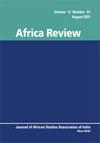通过环境智慧型农业实践维持加纳可可部门:加纳可可生产对环境影响的评估
IF 0.5
Q4 AREA STUDIES
引用次数: 8
摘要
发展中国家可可产业的可持续性在很大程度上取决于对自然环境的保护。因此,迫切需要更多的研究、政策和战略来帮助解决和减少可可生产对环境的影响。本研究采用二级和一级数据来源进行。二级数据是从文件来源收集的,例如粮食和农业部和可可病虫害控制计划(CODAPEC)的报告。另一方面,主要数据涉及对加纳可可委员会的15名外地干事的采访。这些实地工作人员是有意挑选的,以帮助确定可可生产对环境的一些影响。研究表明,可可生产对环境的影响体现在为可可农场扩张而砍伐原始森林(2010年至2015年期间砍伐了117,240公顷森林资源),为建设支线公路而砍伐森林(建造了3000公里的新支线公路,将可可农场与各种销售网点连接起来),以及使用杀虫剂和杀虫剂造成的污染。为了解决这一问题,需要建立有效、高效的大规模农业生产环境影响评价体系和建设通往农场的支线公路。环境保护署等相关监管机构应采取适当措施,确保执行环境评估过程中提出的缓解措施,以尽量减少可可生产对环境的影响。本文章由计算机程序翻译,如有差异,请以英文原文为准。
Sustaining Ghana’s cocoa sector through environmentally smart agricultural practices: an assessment of the environmental impacts of cocoa production in Ghana
ABSTRACT The sustainability of the cocoa industry in the developing world depends heavily on the preservation of the natural environment. There is, therefore, an urgent need for more research, policies and strategies that will help address and minimize the environmental impacts of cocoa production. This study was conducted using both secondary and primary data sources. The secondary data were collected from documentary sources such as reports from the Ministry of Food and Agriculture and the Cocoa Pests and Diseases Control Programme (CODAPEC). On the other hand, the primary data involved an interview of 15 field officers of the Ghana Cocoa Board. These field officers were purposively selected to help ascertain some of the effects of cocoa production on the environment. The study showed that the environmental impact of cocoa production manifest in the clearance of virgin forests for the expansion of cocoa farms (clearance of 117,240 hectares of forest resources between 2010 and 2015), the clearance of forest for the construction of feeder roads (3000 kilometres of new feeder roads constructed to link cocoa farms to the various marketing outlets) and pollution from the use of pesticides and insecticides. In order to address this problem, there is the need for effective and efficient environmental impact assessment system for large scale agricultural production and the construction of feeder roads to farms. Adequate measures should be put in place by the relevant regulatory agencies such as the Environmental Protection Agency to ensure that the mitigation measures proposed in the environmental assessment process are implemented to minimize the environmental footprint of cocoa production.
求助全文
通过发布文献求助,成功后即可免费获取论文全文。
去求助
来源期刊

Africa Review
AREA STUDIES-
CiteScore
1.80
自引率
12.50%
发文量
22
期刊介绍:
Africa Review is an interdisciplinary academic journal of the African Studies Association of India (ASA India) and focuses on theoretical, historical, literary and developmental enquiries related to African affairs. The central aim of the journal is to promote a scholarly understanding of developments and change in Africa, publishing both original scholarship on developments in individual countries as well as comparative analyses examining the wider region. The journal serves the full spectrum of social science disciplinary communities, including anthropology, archaeology, history, law, sociology, demography, development studies, economics, education, gender studies, industrial relations, literature, politics and urban studies.
 求助内容:
求助内容: 应助结果提醒方式:
应助结果提醒方式:


